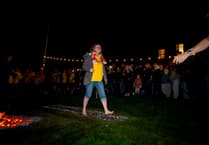WHEN Sir Michael Morpurgo was inspired to write War Horse – first published 40 years ago – the wars of living memory were were not a subject thought suitable for children’s fiction.
The Iddesleigh-based author, now 79, thought otherwise and went ahead with the tale of a Devon farm horse called Joey caught up in the horror of the First World War.
He had heard the basis of the story first hand, by the fireside of the Duke of York pub in Iddesleigh, during the winter of 1979, from a First World War veteran who had lived all his life in the village. This old man remembered the sale at Iddesleigh where horses were rounded up from the farms and drafted into the conflict. His memories inspired Michael’s tale about a Devon lad called Albert who searches for his beloved horse Joey, sold into service in the Army and sent to the Western Front.
At the time, with the First World War in living memory and the Second World War relatively recent, people just wanted to forget. Michael thought it was an important subject though, and managed to find a publisher who agreed, Haye and Ward, who pubished it in October 1982.
‘The book itself had a good editor in ‘82, a really lovely lady called Rosemary Dedham, she was very enthusiastic and the publishing house were very enthusiastic, but when it came out, there were no other books like it, not about recent wars, for children,’ says Michael. ‘There were lots of books about the Vikings, things like that, lots of wars ancient and distant, but I think it was felt that wars which were more recent, that people coud remember, weren’t a subject for young people.
‘Having been a teacher I thought it was important to tell children the stories of recent history as well as ancient history, because it is all their history. It is your job as a writer to pass on how things were to young people, so they can make some sense of how things are. I don’t think you can do one without the other.
‘My concern was to write this story that happened in Iddesleigh all those years ago. What was really wonderful was writing it in the place where it actually happened. I didn’t have to do research for the book, because it is all in the fields and the cottages around and the hills around. This is where it all actually happened. What I did do for research was go to France and Belgium to see the battlefields.’
War Horse was not an overnight success. ‘It sold 800 copies in hardback, it wasn’t Harry Potter by any stretch of the imagination,’ says Michael. It took a while to find a publisher to bring out a paperback edition, and although it was shortlisted for the Whitbread Prize for children’s fiction, it did not win.
Chairman of judges was Roald Dahl. ‘At the prizegiving, he called me over to his table and said it was a good book, but it was wasn’t a book for children. He was wrong, although he was entitled to his opinion, but I think at the time most people would have agreed with him. In those days there weren’t books for children like that. What has happened is the world has changed and more and more wars have come into our living rooms. Children have access to all this now in a way that we didn’t when we were young.’
The war in Ukraine has, sadly, made War Horse ‘more relevant now’. The conflict has uneasy parallels to the Second World War, when Britain came close to being invaded. The Ukrainians are fighting for their freedom the face of an aggressor, Russia. ‘This is going on now, villages are being bombed, they are being bombed like in the Blitz. It is a war that everyone in Ukraine is involved in, young men are enlisted which is exactly what happened here in World War Two.’
In the intervening years, meanwhile, War Horse has been brought to millions at the National Theatre, where it became an award-winning stage play, complete with extraordinarily lifelike puppets made by South African Handspring Puppet Company, on tour worldwide, and then made into a Hollywood film by Steven Spielberg. Now everyone knows War Horse. In Michael’s corner of West Devon, there are War Horse signs, a War Horse sculptures, a War Horse Country Park and, most recently, a War Horse bench outside Hatherleigh Primary School.
Michael pays tribute in a new anniversary edition of War Horse, to his long-time publisher Farshore, kept it in print when it was selling just a few hundred copies. Now it is a worldwide phenomenon, proving beyond doubt that war really is a subject for children’s fiction.
War Horse is Michael’s wife Clare’s favourite novel of the scores he has written, which ‘means a lot’ he says. ‘It has been the most wonderful journey and after 40 years Joey still gallops on.’
The anniversary edition of War Horse is published by Farshore.



.jpeg?width=209&height=140&crop=209:145,smart&quality=75)
Comments
This article has no comments yet. Be the first to leave a comment.